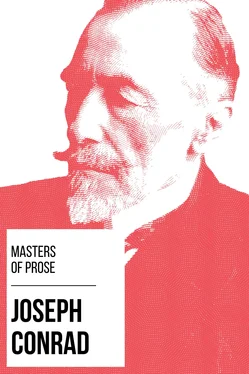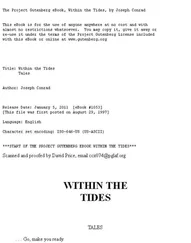Nobody will expect to find between the covers of this little book words of extraordinary potency or accents of irresistible heroism. However humiliating for my self esteem, I must confess that the counsels of Marcus Aurelius are not for me. They are more fit for a moralist than for an artist. Truth of a modest sort I can promise you, and also sincerity. That complete, praise worthy sincerity which, while it delivers one into the hands of one's enemies, is as likely as not to embroil one with one's friends.
“Embroil” is perhaps too strong an expression. I can't imagine among either my enemies or my friends a being so hard up for something to do as to quarrel with me. “To disappoint one's friends” would be nearer the mark. Most, almost all, friend ships of the writing period of my life have come to me through my books; and I know that a novelist lives in his work. He stands there, the only reality in an invented world, among imaginary things, happenings, and people. Writing about them, he is only writing about himself. But the disclosure is not complete. He remains, to a certain extent, a figure behind the veil; a suspected rather than a seen presence—a movement and a voice behind the draperies of fiction. In these personal notes there is no such veil. And I cannot help thinking of a passage in the “Imitation of Christ” where the ascetic author, who knew life so profoundly, says that “there are persons esteemed on their reputation who by showing themselves destroy the opinion one had of them.” This is the danger incurred by an author of fiction who sets out to talk about himself without disguise.
While these reminiscent pages were appearing serially I was remonstrated with for bad economy; as if such writing were a form of self-indulgence wasting the substance of future volumes. It seems that I am not sufficiently literary. Indeed, a man who never wrote a line for print till he was thirty-six cannot bring himself to look upon his existence and his experience, upon the sum of his thoughts, sensations, and emotions, upon his memories and his regrets, and the whole possession of his past, as only so much material for his hands. Once before, some three years ago, when I published “The Mirror of the Sea,” a volume of impressions and memories, the same remarks were made to me. Practical remarks. But, truth to say, I have never understood the kind of thrift they recommend. I wanted to pay my tribute to the sea, its ships and its men, to whom I remain indebted for so much which has gone to make me what I am. That seemed to me the only shape in which I could offer it to their shades. There could not be a question in my mind of anything else. It is quite possible that I am a bad economist; but it is certain that I am incorrigible.
Having matured in the surroundings and under the special conditions of sea life, I have a special piety toward that form of my past; for its impressions were vivid, its appeal direct, its demands such as could be responded to with the natural elation of youth and strength equal to the call. There was nothing in them to perplex a young conscience. Having broken away from my origins under a storm of blame from every quarter which had the merest shadow of right to voice an opinion, removed by great distances from such natural affections as were still left to me, and even estranged, in a measure, from them by the totally unintelligible character of the life which had seduced me so mysteriously from my allegiance, I may safely say that through the blind force of circumstances the sea was to be all my world and the merchant service my only home for a long succession of years. No wonder, then, that in my two exclusively sea books—“The Nigger of the Narcissus,” and “The Mirror of the Sea” (and in the few short sea stories like “Youth” and “Typhoon”)—I have tried with an almost filial regard to render the vibration of life in the great world of waters, in the hearts of the simple men who have for ages traversed its solitudes, and also that something sentient which seems to dwell in ships—the creatures of their hands and the objects of their care.
One's literary life must turn frequently for sustenance to memories and seek discourse with the shades, unless one has made up one's mind to write only in order to reprove mankind for what it is, or praise it for what it is not, or—generally—to teach it how to behave. Being neither quarrelsome, nor a flatterer, nor a sage, I have done none of these things, and I am prepared to put up serenely with the insignificance which attaches to persons who are not meddlesome in some way or other. But resignation is not indifference. I would not like to be left standing as a mere spectator on the bank of the great stream carrying onward so many lives. I would fain claim for myself the faculty of so much insight as can be expressed in a voice of sympathy and compassion.
It seems to me that in one, at least, authoritative quarter of criticism I am suspected of a certain unemotional, grim acceptance of facts—of what the French would call secheresse du coeur. Fifteen years of unbroken silence before praise or blame testify sufficiently to my respect for criticism, that fine flower of personal expression in the garden of letters. But this is more of a personal matter, reaching the man behind the work, and therefore it may be alluded to in a volume which is a personal note in the margin of the public page. Not that I feel hurt in the least. The charge—if it amounted to a charge at all—was made in the most considerate terms; in a tone of regret.
My answer is that if it be true that every novel contains an element of autobiography—and this can hardly be denied, since the creator can only express himself in his creation—then there are some of us to whom an open display of sentiment is repugnant.
I would not unduly praise the virtue of restraint. It is often merely temperamental. But it is not always a sign of coldness. It may be pride. There can be nothing more humiliating than to see the shaft of one's emotion miss the mark of either laughter or tears. Nothing more humiliating! And this for the reason that should the mark be missed, should the open display of emotion fail to move, then it must perish unavoidably in disgust or contempt. No artist can be reproached for shrinking from a risk which only fools run to meet and only genius dare confront with impunity. In a task which mainly consists in laying one's soul more or less bare to the world, a regard for decency, even at the cost of success, is but the regard for one's own dignity which is inseparably united with the dignity of one's work.
And then—it is very difficult to be wholly joyous or wholly sad on this earth. The comic, when it is human, soon takes upon itself a face of pain; and some of our griefs (some only, not all, for it is the capacity for suffering which makes man August in the eyes of men) have their source in weaknesses which must be recognized with smiling com passion as the common inheritance of us all. Joy and sorrow in this world pass into each other, mingling their forms and their murmurs in the twilight of life as mysterious as an over shadowed ocean, while the dazzling brightness of supreme hopes lies far off, fascinating and still, on the distant edge of the horizon.
Yes! I, too, would like to hold the magic wand giving that command over laughter and tears which is declared to be the highest achievement of imaginative literature. Only, to be a great magician one must surrender oneself to occult and irresponsible powers, either outside or within one's breast. We have all heard of simple men selling their souls for love or power to some grotesque devil. The most ordinary intelligence can perceive without much reflection that anything of the sort is bound to be a fool's bargain. I don't lay claim to particular wisdom because of my dislike and distrust of such transactions. It may be my sea training acting upon a natural disposition to keep good hold on the one thing really mine, but the fact is that I have a positive horror of losing even for one moving moment that full possession of my self which is the first condition of good service. And I have carried my notion of good service from my earlier into my later existence. I, who have never sought in the written word anything else but a form of the Beautiful—I have carried over that article of creed from the decks of ships to the more circumscribed space of my desk, and by that act, I suppose, I have become permanently imperfect in the eyes of the ineffable company of pure esthetes.
Читать дальше












